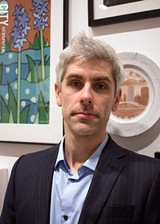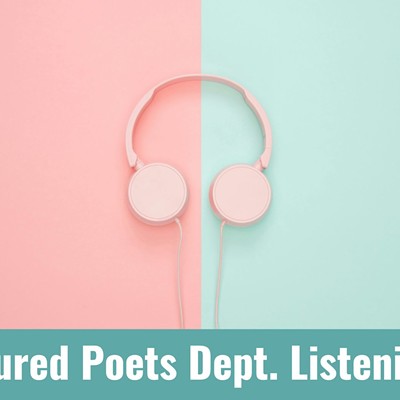[
{
"name": "500x250 Ad",
"insertPoint": "5",
"component": "15667920",
"parentWrapperClass": "",
"requiredCountToDisplay": "1"
}
]
Representatives of some of Rochester's arts organizations will be meeting next week to reignite a discussion they've been having for years: creating an endowment or some other kind of ongoing arts funding.
Elaine Spaull, who chairs City Council's Arts and Culture Committee, is convening the meeting, which is scheduled for December 14.
The big arts story for the past couple of years has been RBTL's proposal for a new theater, which would require massive amounts of public and private funds. But an equally important, often ignored issue is that the arts in general – large organizations like Geva and small ones like galleries and independent performance groups – need more financial support. State funding for the arts has declined sharply, as has funding from major industries like Kodak.
A recent consultant's report touched on that need briefly and gave examples of what other cities are doing. The report, by the arts and entertainment consultants AMS Planning and Research, was written for city officials, who were considering letting RBTL build a new theater on the former Midtown Plaza site known as Parcel 5.
Numerous other arts groups had objected, concerned that the theater might hurt their own audiences and fundraising. Most of the AMS report focused on the impact a new theater was expected to have, but at the end of the report, AMS noted that some cities have used taxes to help fund local arts. St. Louis, for instance, allocates some of its property taxes to the arts each year. Denver and Pittsburgh allocate some of their local sales tax revenue.
Spaull says she's hopeful that the AMS study can be used to generate a renewed discussion about sustainable support for the arts. Local arts groups, she said late last week, "need operating money and coordination." With the RBTL theater no longer dominating the discussion, "this can be a new day now," she said.
This isn't a new topic for Rochester. Over decades, arts organizations, arts supporters, and some public officials have urged Rochester to create a "1 percent for the arts" program, requiring developers to set aside 1 percent of the cost of their projects for the arts.
Some kind of ongoing, sustainable funding for the arts is "an increasingly dear topic for me," says Bleu Cease, director of the Rochester Contemporary Art Center. Cease has been watching what other cities are doing to support the arts, and has been visiting Cleveland to look at its growing arts community. "Other cities have a strong mechanism" to support the arts, he says. "We don't. It's inexcusable."
"I've been talking with the city about 1 percent for over 10 years," he says. And, he says, he's becoming "increasingly anxious" about the funding need. "There have now been two or three generations of arts administrators" – heads of museums and other organizations – "who have been involved in this conversation," he says.
The discussion "comes and goes," says Cease," popping up with a crisis or major challenge such as RBTL's theater plan, "and then it peters away."
City officials have discussed the 1-percent idea since the AMS report was released, says the city's chief of staff, Alex Yudelson. But, he said last week, "it's tough": If the requirement is attached to public-works projects, it increases the cost of those projects, and the city is already operating on a tight budget.
And while other cities have adopted that requirement for private developments, "we've put a lot of pressure on developers lately," Yudelson said, including requiring some projects to set aside a certain number of units for low-income tenants.
"We want to make sure that we're not just tacking on additional requirements and eventually make projects not feasible," Yudelson said.
"We'll definitely look at something like a 1 percent for the arts," he said. But he also suggests that arts organizations might consider sharing services: ticket sales, for instance.
Yudelson plans to be at the December 14 meeting that Spaull is convening with the arts organizations. "We need to hear from them," he said.
Communities have a variety of ways to provide an ongoing funding source besides a 1 percent requirement on development – not only sales and property taxes, as the AMS study noted, but use taxes on such things as rental cars and cigarettes. But the city's options are limited. New York's sales tax is a state and county tax; there's no city sales tax. And if the city were able to assess a tax on cigarettes or rental cars, people would likely simply take that business to the suburbs.
In addition, the arts aren't solely a concern of the city. They're a metropolitan concern. Many of the people who attend arts events and exhibits live in the suburbs, not the city. And county government, like city government, does contribute to numerous individual arts organizations, including Geva, the Memorial Art Gallery, and the Rochester Philharmonic.
An obvious funding source is the county's hotel-motel tax: charges added to visitors' room costs. Yudelson says he's not optimistic about the chances of diverting some of that for the arts, though. Part of that tax already funds two venues owned by the city: the Convention Center and Blue Cross Arena, and it's a sore point with the city. Hotel-motel tax revenue has grown by $2.3 million since 2005, and city officials have asked the county to increase the allocation to the two city venues. Instead, the funding has stayed flat.
Roz Goldman, an arts appraiser and a long-time arts activist, says a 1 percent for the arts assessment is essential. It's what cities similar to Rochester have, she said. "And it has to come from developers," she said, not from publicly funded projects: "from those who are making money from development in the city."
Goldman agrees that arts support should be countywide. But, she said: "We have better chances with the City of Rochester than with the county."
"Hand in hand with that," she said, "we need what most cities have: an arts commission," which coordinates efforts related to projects such as public art.
"I'm getting very tired," Goldman said, "because I've been talking about this for 25 years."
"It's embarrassing," she said, "because we have so many working artists, so many cultural institutions."
Speaking of...
-
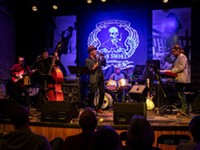
The year of living dangerously — a 2021 arts recap
Dec 29, 2021 -
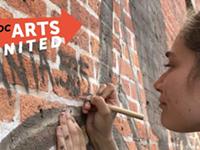
Roc Arts United launches central resource site for artists and orgs
Oct 4, 2021 -
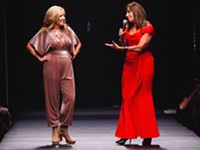
Fashion Week Rochester returns in October
Jul 29, 2021 - More »
Latest in News
More by Mary Anna Towler
-

Police reform: advocates on what should come next
Oct 22, 2019 -

Court clears the way for Police Accountability referendum
Oct 17, 2019 -

Dade outlines initial actions on district deficit
Oct 9, 2019 - More »
